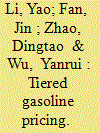|
|
|
Sort Order |
|
|
|
Items / Page
|
|
|
|
|
|
|
| Srl | Item |
| 1 |
ID:
187610


|
|
|
|
|
| Summary/Abstract |
This paper investigates the trade-offs between progressivity and effectiveness for a carbon tax versus an ‘excessive consumption’ levy. To do this, we compare the distribution of consumer welfare impacts and environmental effectiveness of an air travel carbon tax and a frequent flyer levy. Results show that both policies have the potential to achieve substantial carbon mitigation with minimal impacts on consumer welfare. Nevertheless, compared with a carbon tax, a frequent flyer levy is more progressive and effective at reducing emissions – thus, there is no trade-off between progressivity and effectiveness by using an excessive consumption levy to mitigate air travel emissions. Furthermore, considering the pronounced growth in demand projected for air travel over the next 30 years, results show the frequent flyer levy will remain more progressive and effective over time. Although further research is needed to assess the trade-offs on the supply-side (e.g., protection of regular customers, dynamic efficiency) and related to implementation (e.g., data privacy, the role for revenue recycling), such an excessive consumption levy has the potential to be an equitable, effective and politically acceptable environmental policy for curbing carbon dioxide emissions. This is relevant not only for air travel but for other forms of consumption in which the affluent are responsible for a large share of demand and associated carbon emissions.
|
|
|
|
|
|
|
|
|
|
|
|
|
|
|
|
| 2 |
ID:
150782


|
|
|
|
|
| Summary/Abstract |
This paper proffers a tiered gasoline pricing method from a personal carbon trading perspective. An optimization model of personal carbon trading is proposed, and then, an equilibrium carbon price is derived according to the market clearing condition. Based on the derived equilibrium carbon price, this paper proposes a calculation method of tiered gasoline pricing. Then, sensitivity analyses and consumers' surplus analyses are conducted. It can be shown that a rise in gasoline price or a more generous allowance allocation would incur a decrease in the equilibrium carbon price, making the first tiered price higher, but the second tiered price lower. It is further verified that the proposed tiered pricing method is progressive because it would relieve the pressure of the low-income groups who consume less gasoline while imposing a greater burden on the high-income groups who consume more gasoline. Based on these results, implications, limitations and suggestions for future studies are provided.
|
|
|
|
|
|
|
|
|
|
|
|
|
|
|
|
|
|
|
|
|